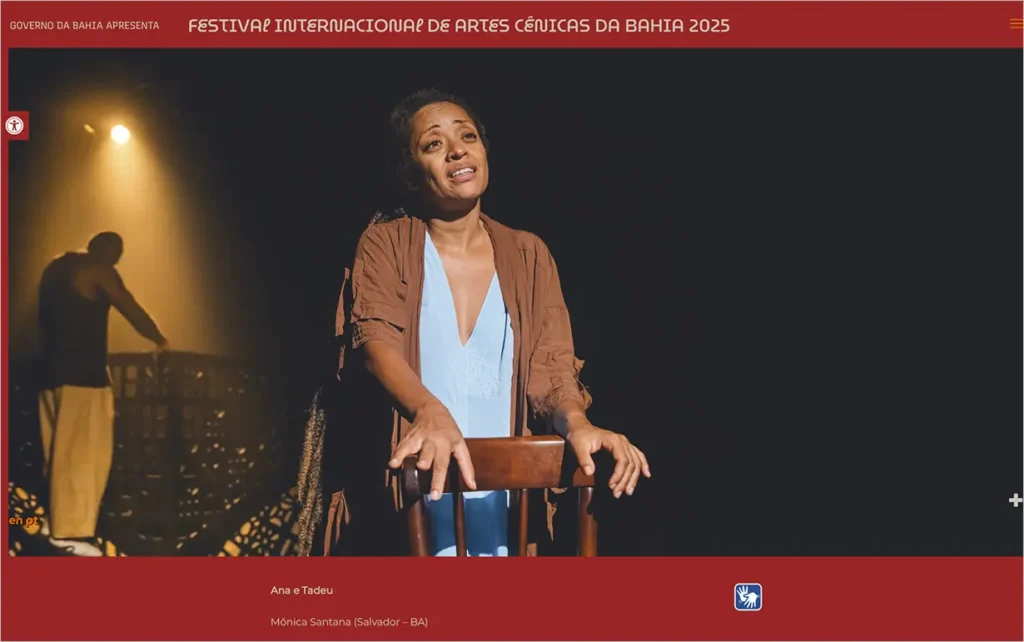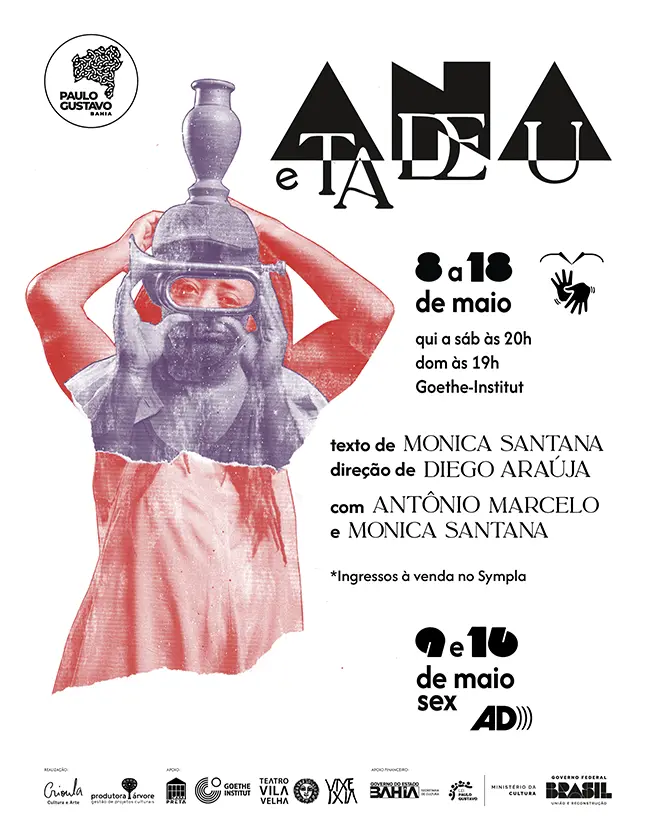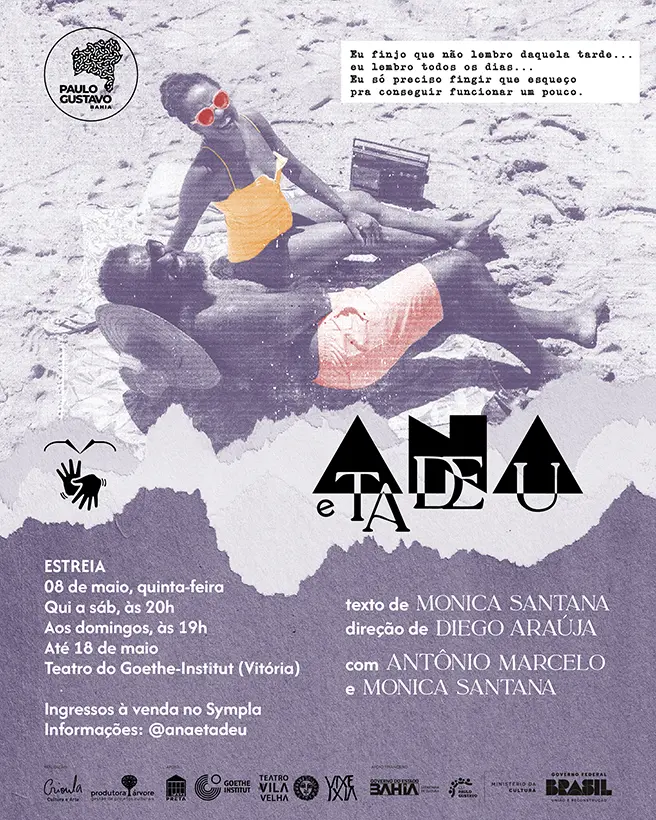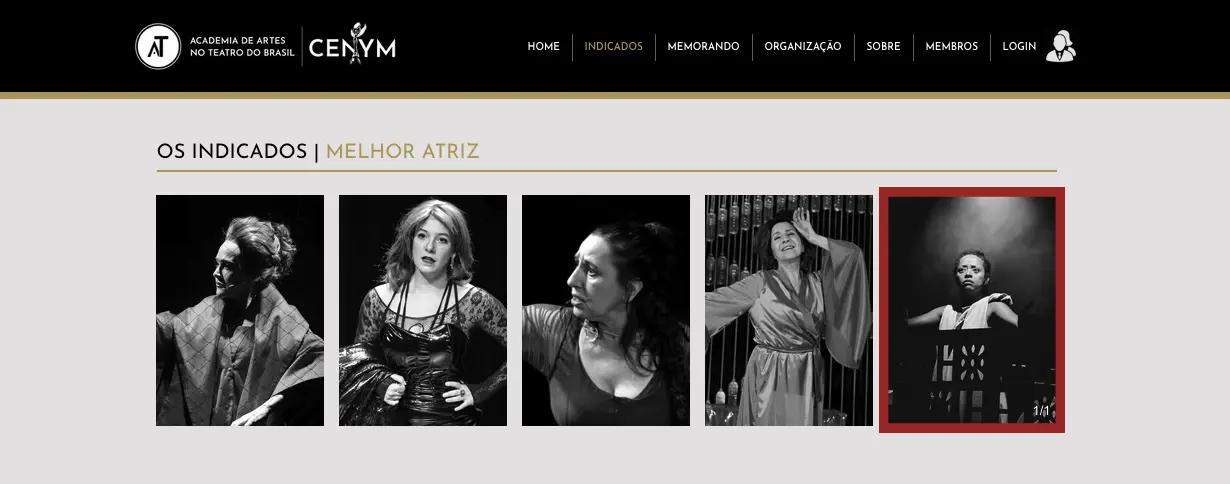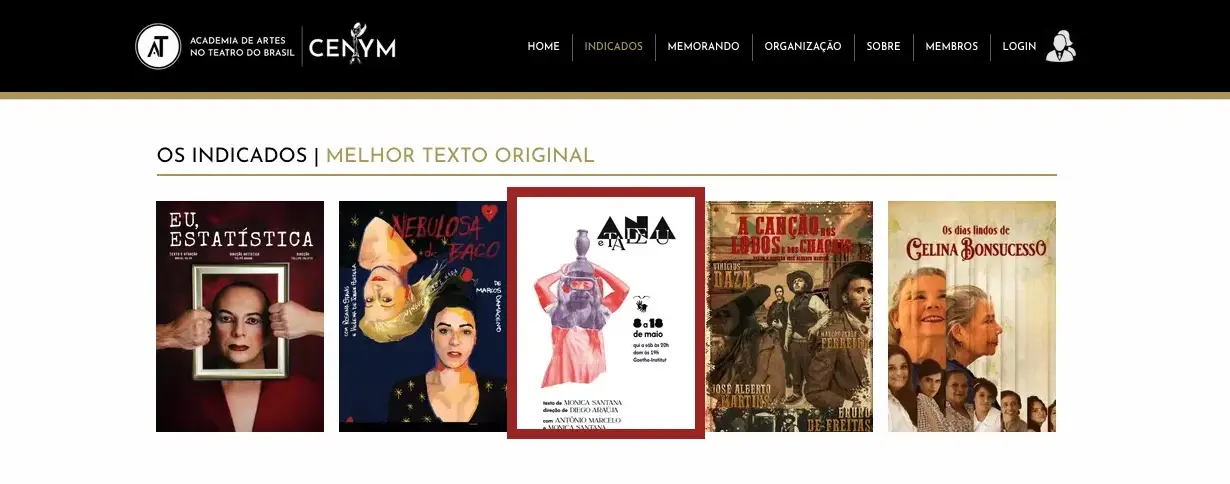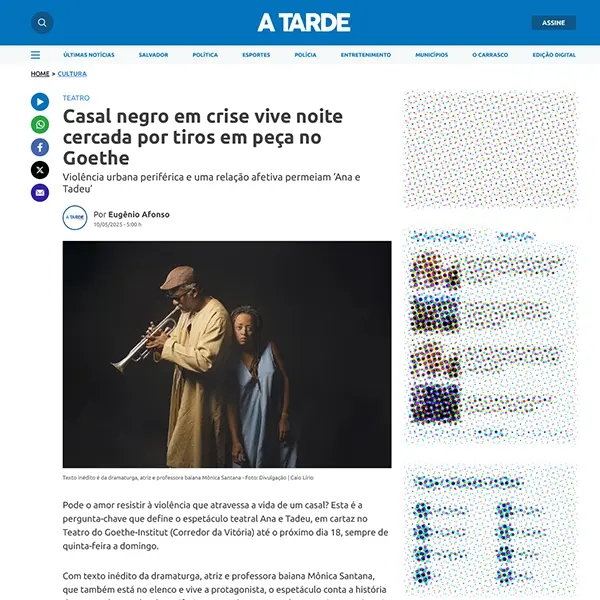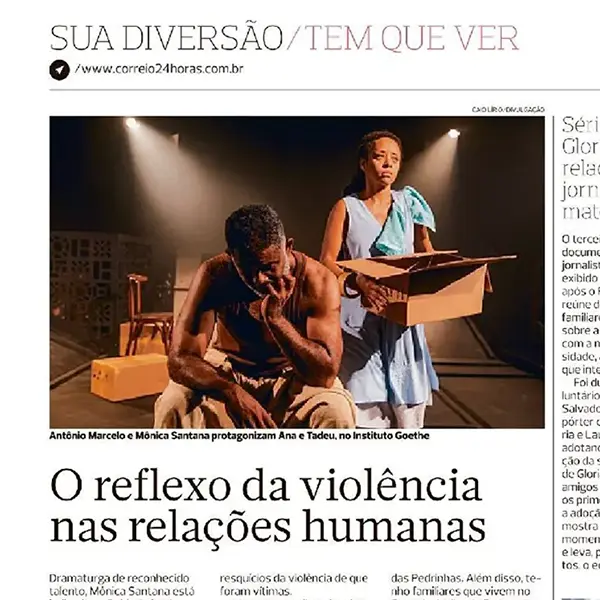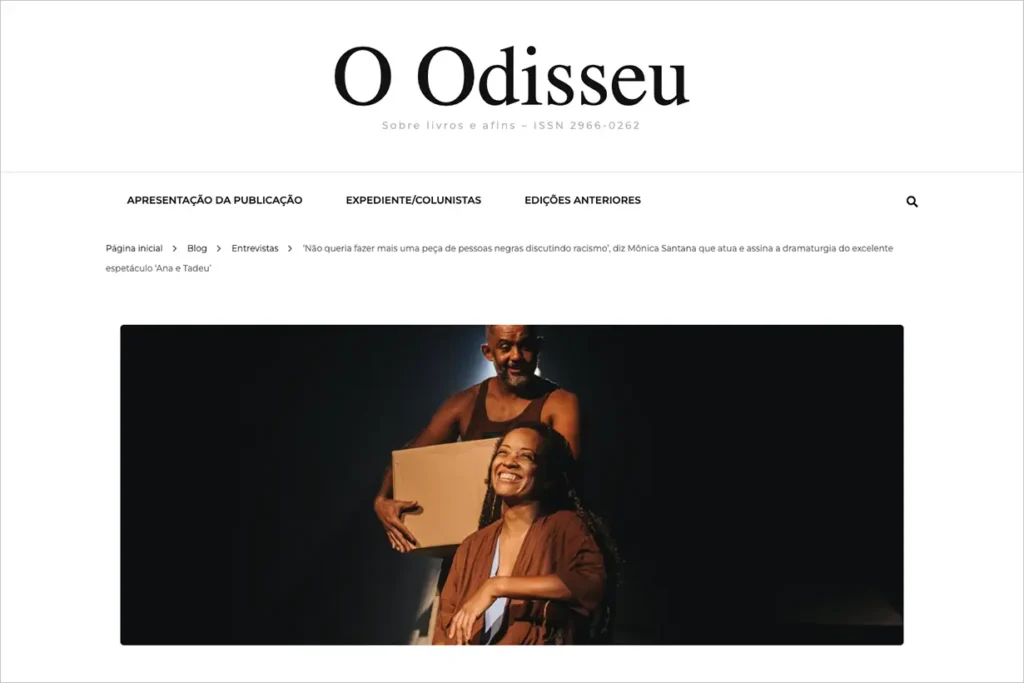Ana e Tadeu
Ana and Tadeu
Conceived and written by Mônica Santana
Directed by Diego Arauja
Salvador (BA)
Premiere: 2025
Last updated: 27 October 2025
Photos by Caio Lírio
Ana and Tadeu have been married for fifteen years and have a son, the boy Jorge. Urban violence sets off a chain of events that irreversibly changes the lives and subjectivities of these characters. With the marriage in ruins, Tadeu returns to collect his belongings and move out. However, he finds the house caught in a crossfire. Confined, Ana and Tadeu smooth over the last rough edges of a relationship hemmed in by affection, pain, and the very violence that cuts through and constrains them.
Date and time: 2 November, 5:00 PM
Venue: Teatro do Goethe-Institut (Goethe-Institut Theater)
Running time: 80 minutes
Age rating: 16+
Accessibility: Brazilian Sign Language (Libras) interpretation
Tickets: R$ 30,00 and R$ 15,00 — CLICK HERE to purchase your ticket
The Production
Can love withstand the violence that cuts through a family’s life, utterly reshaping their existence? The production Ana e Tadeu (Ana and Tadeu) poses this and other questions to audiences as it narrates the story of a couple in the midst of separation while they are caught in a crossfire. The staging presents a new playtext by Mônica Santana (playwright nominated for the Prêmio Bahia Aplaude 2025 — Bahia Aplaude Award, 2025) and is directed by Diego Araúja (winner of the Prêmio Braskem de Teatro 2019 — Braskem Theatre Award, 2019, in the Text category).
Portrayed by actors Antônio Marcelo (Candomblé da Barroquinha) and Mônica Santana, the characters find themselves in an extreme, high‑stakes situation — increasingly common in the everyday life of Brazil’s major cities. More than addressing a social theme, the piece undertakes a deep dive into the subjectivity of two people whose lives are shot through by violence. Ana is a sociologist and activist, deeply rooted in the neighborhood where she grew up and determined to remain there, even amid the area’s gradual transformation. Her ex‑husband, Tadeu, is a musician who resumes his artistic career after the split.
Dramaturgy and Staging
For the playwright and project conceiver, Mônica Santana, “the work seeks to address the entrenched, under‑siege condition of two Black people who possess a rich wealth of lived experience and trajectories, yet live in a peripheral community and grapple with the entrenchment imposed on that territory.” For the author, the piece begins with an intimate focus on two characters—replete with their particularities, flaws, and singularities—examining how they are affected by violence. “What kind of subjectivity is forged out of the losses, constraints, and defeats imposed on Black people? That is a question that motivated the creation of Ana e Tadeu,” she adds.
In addition to directing the production, Diego Araúja also conceived the scenic design, alongside scenic designer Erick Saboya, proposing the image of a house that collapses and dissolves—both under external attacks and through the mutual aggressions that take place in the intimate sphere. For the director, “I observe that Ana e Tadeu fosters a conversation, through scenic-performative means, about affect within Afro-Brazilian community and family relations. Precisely for that reason, it is a study of how these affects are mobilized and enacted within the Black subject and among Black subjects.” Onstage, he proposes a play of visibilities between the characters’ sensitive, immaterial dimension and a stylization of what might otherwise be concrete (this house that collapses, this crossfire that turns into music, this reality that dissolves). “After love and mourning, the piece entwines itself among soliloquies, conversations, words, and aggressions; a verbal torrent that asserts lack through excess,” the director notes.
Ana e Tadeu also features choreographic direction by Neemias Santana, who proposes non‑conventional movement vocabularies for the actors’ bodies, rendering material the inner dimension of their conflicts.
The musical score is composed by Andrea Martins and Ronei Jorge, with DJ Nai Kiese on live operations during performances. Costume design is by Alexandre Guimarães, and lighting design is by Caboclo de Cobre, rounding out the project’s creative team, which is produced by Crioula Arte e Cultura (Crioula Arts and Culture) and Produtora Árvore (Árvore Productions).
Production History
FIAC 2025 (Bahia International Performing Arts Festival): 2 November 2025 | Teatro do Goethe-Institut (Salvador, Bahia, Brazil)
Melanina Acentuada Festival — Year VII: 10–11 July 2025 | Teatro do Goethe-Institut (Salvador, Bahia, Brazil)
Full performance video
If you would like to watch the full video of the production, please request the link from Mônica Santana at falecommonicasantana@gmail.com
Creative and Technical Team
Conceived and written by: Mônica Santana
Directed by: Diego Araúja
Actor: Antonio Marcelo
Actress: Mônica Santana
Assistant direction: Neemias Santana; Quemuel Costa
Choreographic direction: Neemias Santana
Scenic design: Diego Araúja; Erick Saboya
Scenic construction: Felipe Cipriani (Oxe Arte)
Original score and music direction: Andrea Martins; Ronei Jorge
DJ and sound operation: Nai Kiese
Sound engineering: Acelino Costa; Nai Kiese
Lighting design: Caboclo de Cobre
Lighting operation: Caboclo de Cobre; Almir Gaiato
Lighting technician: Almir Gaiato
Costume design: Alexandre Guimarães
Costume construction (sewing): Maria de Lourdes
Dreadmaker (hair): Daniel Tulipeno
Production: Fabiana Marques
Production assistant: Lucas Oliveira
Administrative and financial management: Thayná Mallmann
Communications: Mônica Santana
Visual identity and graphic design: Duna (Lia Cunha; Isabella Coretti)
Photography (graphic design): Priscila Fulô
Photography (press/publicity): Caio Lírio
Video capture and editing: João Rafael Neto
Mônica Santana
Conception and dramaturgy
Playwright, actress, professor, and communicator. She holds a PhD and Master’s degree in Performing Arts from the Graduate Program in Performing Arts at the Federal University of Bahia (UFBA). She currently teaches in the Professional Master’s Program in Performing Arts, at Célia Helena Center for the Arts, and at Itaú Cultural.
For Ana e Tadeu (Ana and Tadeu), she received a nomination at the Cenym National Theater Award in the categories of Best Original Text and Best Actress. In 2025, she was nominated for the Bahia Aplaude Trophy in the Best Text category for her work as a playwright in Sr. Oculto (The Hidden Gentleman). In 2015, she won the Breakthrough category for her solo performance Isto não é uma mulata (This Is Not a Mulata). Through this work, the artist gained national prominence, being recognized as one of the most influential Black women and artists by both the Black Bloggers Collective (Coletivo Blogueiras Negras) and the NGO Think Olga.
Website: https://www.monicasantana.com.br/

Diego Araúja
Direction
An artist from Salvador, Bahia, with fourteen years of practice across the performing, visual, literary, and audiovisual arts, working as a director, scenic designer, playwright, screenwriter, and author. He holds a Bachelor’s degree from the School of Theatre at UFBA (Federal University of Bahia) and co‑founded, with Laís Machado, the Plataforma ÀRÀKÁ (ÀRÀKÁ Platform), dedicated to the creation and research of Afro‑diasporic memory.
He has taken part in national and international festivals — FIAC‑BA (Festival Internacional de Artes Cênicas da Bahia — Bahia International Performing Arts Festival), Theatertreffen, ADELANTE, FIT‑BH (Festival Internacional de Teatro de Belo Horizonte — Belo Horizonte International Theatre Festival), FRESTAS, EFIE. He was a founding member and editor of Revista Barril. He won the Prêmio Braskem de Teatro (2019) — Braskem Theatre Award, 2019 — for Prontuário da Razão Degenerada (Case File of the Degenerate Reason) and the 5º Prêmio Leda Maria Martins — 5th Leda Maria Martins Award — for QUASEILHAS (ALMOST‑ISLANDS). In 2023, he participated in the 35ª Bienal de São Paulo — Coreografias do Impossível (35th São Paulo Biennial — Choreographies of the Impossible) with Sumidouro nº 2 — Diáspora Fantasma (Sinkhole No. 2 — Ghost Diaspora).

Reviews
“I must pause to highlight the impressive acting by both Mônica and Antonio, although, as we know, Antonio’s great challenge is to share the stage with an actress like Mônica Santana. Onstage, she commands; she is mesmerizing. It’s a performance that is rooted in the body—a wholehearted, full‑bodied acting. Another actor might simply fade beside her, but Antonio Marcelo also shines in moving moments. This is only possible because the text summons this cracking open, steering the characters away from predictable superficiality and presenting them to the audience as complex beings. That, in fact, is the production’s chief merit as a whole.”
Ewerton Ulisses Cardoso, for Revista Odisseu (Odisseu Magazine)
Read the full text — click here.
Touring and Setup
Core touring team
Director and scenic designer: Diego Araúja
Production: Lucas Oliveira
Cast: Mônica Santana; Antonio Marcelo
Sound operator (Op. Sound): Nai Kiese
Lighting operator (Op. Light): Caboclo de Cobre
Scenic installation coordination: Erick Saboya
Total: 7 people (can be accommodated in double rooms)
Setup (load‑in and technical preparation)
A total of 5 shifts are required for the technical setup:
- 2 shifts for scenic installation (set build/installation)
- 3 shifts for lighting rigging and lighting console programming
Strike (load‑out)
Scenic strike can be completed in 1 shift, with support from 2–3 loaders.
QUER TER PÁGINAS NO TRILHAS DA CENA?




